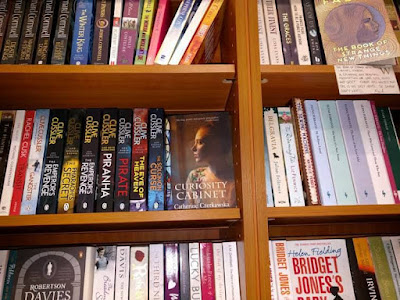 |
| My cohort of teachers in our Finnish language school. I'm the very dark girl with the 'Purdey'' haircut and the red sweater, at the back. Photo courtesy of fellow teacher, Wladek Cieplinski. |
Next week, Lyon and Turnbull in Edinburgh are holding a Rare Books and Manuscript Sale. Among much else of a vastly rarer nature, (letters signed by Mary Queen of Scots herself, no less!) they are selling two little bundles of letters written to me in the 1970s.
Lot 64 is a correspondence from Ian Hamilton Finlay, and Lot 65 is a collection of autograph (i.e. hand-written) letters from George Mackay Brown. Back then, I was a young writer, just starting out on my career, and they were both friends and mentors. The letters were precious to me, and I have kept them for fifty years, but now the time has come to let them go. I began to be afraid that when I'm gone, they would finish up in a skip. Since they are such a reflection of their time and place, an insight into two great poets, I wanted to see them preserved and archived.
The letters from Ian, ten in all, are closely typewritten, often on both sides of his headed paper, and annotated by hand in his own frank, energetic and inimitable style. They talk about various topics, and include observations about his building work at his amazing garden at Little Sparta. 'We have raised the level of our loch and I am building, with great labour, a little island,' he wrote. I had been a fan of his work as soon as I learned about it, and visited the garden. He calls me one of the 'last letter writers' in the world, and perhaps I was.
I first met George when I spent a summer in Orkney, cycling about, visiting innumerable neolithic passage graves, writing poetry, and spending time with Strathclyde Theatre Group, who were performing there. His correspondence is 'warm, personal and detailed' as Lyon and Turnbull describe it, and has a great deal to say about Orkney life and events there, his friendships and his BBC work - kindly and encouraging for me, gold dust for any scholar.
In 1975, I moved to Finland to teach English as a Foreign Language. You can read about that time in a previous post, here. But it was then that my correspondence with these two Scottish greats dwindled, although George and I exchanged Christmas cards for many years. I simply had too many letters to write. I was sending fat, newsy letters to my parents just about every week (no Facebook Messenger back then) and I was keeping in touch with various university friends who were also travelling, or starting on new and exciting careers. Besides that, I was teaching for long hours, and enjoying it very much, doing my own writing whenever I could, and accepting a great many invitations from my students. I loved Finland and only left because I wasn't really making enough money to carry on living there, and saw no career pathway that I could follow.
After that, I spent a year in Poland, teaching English at Wroclaw University. By the time I came back to Scotland, my own creative career, writing commissioned drama for BBC Radio, some television and the theatre - as well as writing fiction and working as a community writer for the Arts in Fife - was taking off and absorbing all my time.
These two bundles of letters are, therefore, two little jewels or precious fossils: a slice of time that will never come again. I even kept the envelopes. I loved my work and I loved my writing back then. Not the struggle to make a decent living (vain hope!) but the sheer pleasure of exploring and communicating, of shaping words and ideas. In these days of creative writing degrees, the constraints imposed by the internet and academic judgments, I sometimes wonder if young writers can ever feel that same intense pleasure in exploration, the freedom of it. I hope so, but I have my doubts.
I was lucky enough to be mentored by real, practising writers whose work I admired. Whatever else she was doing, the hopeful girl you can see in the picture above, with her 'Purdey haircut' always wrote unselfconsciously and took immense pleasure in the work. Now, much older, but not a lot wiser, I hope to find a way of rediscovering that joy.
You'll find full details of the forthcoming (18th June) sale at Lyon and Turnbull.





















